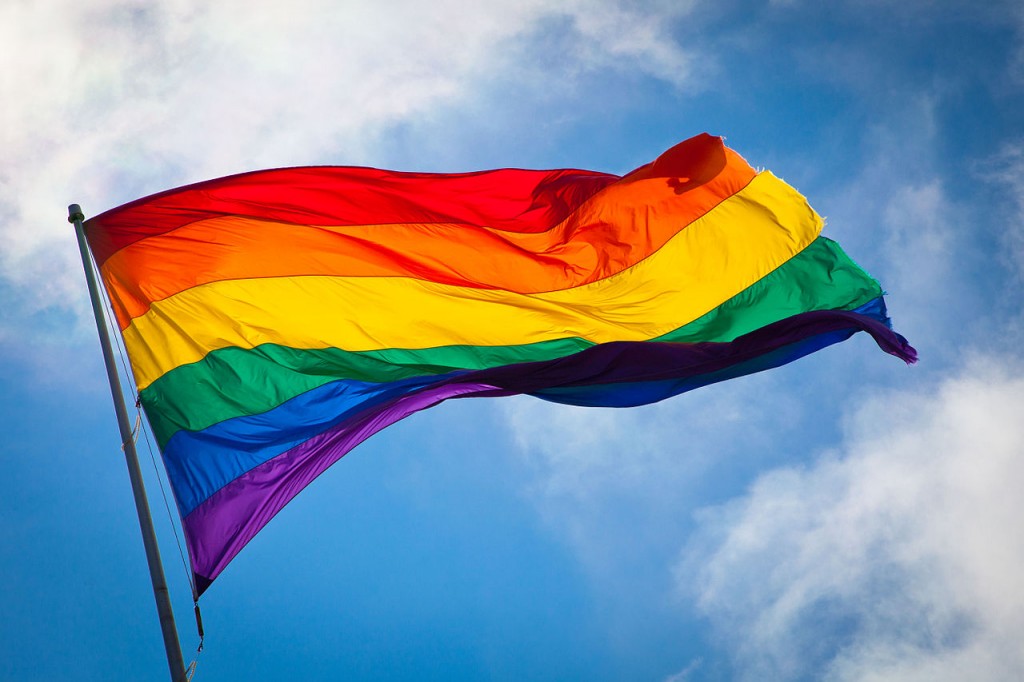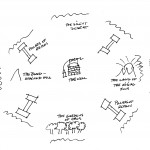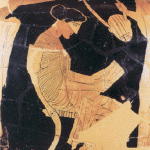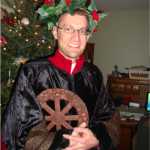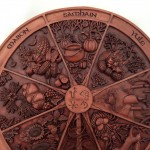“Humanity will reach maturity and wisdom on the day it begins, not just to tolerate, but to take a special delight in differences in ideas and differences in life forms.” — Gene Roddenberry
What is this Unitarian Universalism all about?
It’s been around 200 years since William Ellery Channing launched the American Unitarian movement. And it’s been 50 years since the Unitarian and Universalist denominations merged creating the UUA and UUism as we know it today. But still, most people still don’t know what UUism is all about — and that goes for many of the people on the inside as well as the outside of the church walls.
Take for example, this lady’s visit to a UU congregation on week 16 of her 52 Week-52 Churches project:
“For the first time since beginning my worship project I left the service a little confused. I have no idea what the Unitarian worships. There is no mention of God or Jesus, no cross, no nothing. The Reverend and his alter leader let us know that the Unitarians ‘welcome everyone – black, white, brown, gay, lesbian, bi-sexual, everyone.’ So we have that established early on. Please remember that as I write the following I am only sitting in this church one time as newcomer. I have no background, no history, no study of this particular worship. My thoughts and feelings are only my own as an outside observer one time.
“There was a LOT of focus on the poet T.S. Elliot and his writings prior to his mid-life crisis in his 40′s when he, much to the shock and disappointment of his family and friends, became a “Christian”. Apparently the Unitarian Church has a long history of liberal thought stretching back to the 1800′s. I had no idea. For some reason I thought Unitarianism was a relatively newer religion that had come out of the New Age movement. That is not correct.
“What I felt when I was in the church is that it is more self-centered rather than God-centered. That it’s more of a community centered activism group than a true place of worship – although there was definitely worship occurring – I just couldn’t figure out what we were worshipping. Perhaps it is people coming together with a common philosophy and belief system that is not necessarily tied to God? …
“There was so much that was familiar in an unfamiliar sort of way. There was a candle on an altar, a Reverend wearing a traditional black robe (which actually seemed overly formal), and spiritual sounding music that focused not on God but on the earth and nature. There were traditional song books that focused on the sun, the earth and the sea. There were no bible passages. I had actually begun to wonder if T.S. Elliot was their leader.”
Obviously, this lady did not do her homework — before or after her visit to the UU. But the more significant point is this: she walked into a UU service with an open mind, and left just as confused.
Now, we can chalk it up to her own biases and ignorance. But keep in mind, this is a relatively open-minded — if poorly informed — individual. In her bio, she describes herself as a “non-church going, lapsed Catholic, married to a Buddhist, spiritual being” who, after having visited a Buddhist temple in Tokyo and an Amish country town in Montana realized she was hungry for a spiritual experience of her own and set out on a year-long project of visiting a different church every week. This sounds like the kind of person that UUs would like to attract. But unfortunately, this person came and went through a UU congregation with no better understanding of UUism. And I think that is at least as much our failure as it is hers.
And I don’t think her experience is unusual either. In fact, I think it is probably the experience of many people who attend the UU service regularly. People like myself.
Something is missing.
We UUs have our 7 Principles and our creedless creeds (“Love is our doctrine, the quest for truth is our sacrament, and service is our prayer …”), but we have nevertheless failed to communicate a coherent message to the world. UU Rev. Tom Schad, responding to my recent post “The Baby is the Bathwater: Why I haven’t joined the Unitarian church”, argues that UUs do have a story to tell. Unfortunately, he believes it is “the story of the Enlightenment”. The problem, as I see it, is that the Enlightenment was an incomplete success at best (for some of the reasons which I explained in my recent post). The Enlightenment set us on the path of freedom from superstition and prejudice, but it failed to satisfy our deeper human needs for connection and meaning.
“We have some truths to share,” writes Schade. “We have to tell people what we know.” I couldn’t agree more. The problem is that we don’t know what we know. According to Schade, our “testimony of reality” is that “the path to health and healing and planetary salvation is each of us living with reverence and awe, honesty, humility, gratitude and generosity, openness, solidarity and self-possession, in communities of justice and faith.” I think he is on to something. A message about “a path to health and healing and planetary salvation” is just what UUs need. But a list of virtues is not enough, especially when the first of those — reverence and awe — continue to be problematic notions for UUs (in spite of ongoing discussions about developing “a language of reverence”). Reverence is key, I agree, but reverence for what? As Stephen Prothero observes, “religion does not exist in the abstract. You cannot practice religion in general, any more than you can speak language in general.”
Something is missing. I feel it. “52-Weeks Lady” (she doesn’t give her name on her blog) felt it. Unitarian minister John Trevor and a host of others who I quoted in my previous post felt it. I know others do too. Schade calls this “something”, the “great white whale of contemporary Unitarian Universalism.” But dismissing this feeling does not make it go away. Nor does telling us that all of our spiritual problems were solved by a cultural/intellectual movement which began in the 17th century and ended over 200 years ago. This comes, I think, from the what UU minister Forrest Church calls the “God-shaped hole”. UU Minister Tony Lorenzen writes, “The bottom line reason just about everyone shows up at a church, especially a Unitarian Universalist church, is that they have felt a ‘God-shaped hole’ in their life.” We need not fill the hole with “God” per se, but we do have to fill it with some ultimate meaning. What does UUism offer to fill that hole? I think we UUs have to collectively answer “52-Weeks Lady’s” question: “What do we worship?” Or, if you don’t like the word “worship”, then “What do we reverence?”
What do we reverence?
I think many UUs might point to community itself to answer that question. But what does that mean? Do we worship ourselves?
A while ago I came up with the idea of “multiple centers” to explain the diversity of the Pagan community that I am a part of. The idea is that the Pagan community consists of multiple overlaping groups, each with different centers. I identified three centers: deity, earth, and Self (or soul). Thus, there are earth-centered Pagans, deity-centered Pagans, soul-centered Pagans, etc. Each of these centers represents something that transcends our little selves, a “transcendental ideal” if you will. This transcendental ideal is what drives individual and collective spiritual life.
I played with the idea of a fourth center — community — but it just didn’t make sense to me. I understand an earth-centered community or a deity-centered community. But what is a community-centered community? Isn’t that redundant? And if not, what is the difference between a community-centered religion and a community-centered social club, or a community-centered community center? “52-Weeks Lady” seems to have had the same question: “I just couldn’t figure out what we were worshipping,” she writes. “Perhaps it is people coming together with a common philosophy and belief system that is not necessarily tied to God?” I agree that the answer to her question has something to do with community. But I am equally convinced that it is not about a common belief system, since it seems like the only thing UUs agree on is that they don’t agree. But I think it is very interesting that “52-Weeks Lady” was convinced that there was “definitely worship occurring” at the UU, even though she couldn’t figure out what the object of that worship was. We UUs are, for the most part, not deity-centered. There are earth-centered UUs, but that doesn’t describe all UUs. And there are Self- or soul-centric UUs, but again, that’s not all UUs either. How then do we UUs define that awesome otherness that moves us to — for lack of a better word – worship?
The “Spirit of Life” is a phrase that one sometimes hears in UU hymns, sermons, and discussions. The word “life” has many meanings, but I want to focus for a minute on the biological aspect of life, the aspect that we Darwin-loving UUs can easily understand. Biological life is life which evolves. It is life which diversifies. It is life which only manifests in its particular expressions, but also transcends its individual parts to become something greater than the sum of its parts — an ecosystem. Could this description of biological life also be fitting model for our congregational life? Biology teaches us that biodiversity is essential for the growth of a healthy ecosystem. Perhaps it is also true that spiritual diversity is essential for the growth of a healthy spiritual community. Could this idea of life — life evolving, life in all its diversity — in some way be the idea which is missing from UU worship, that object of reverence which eludes us, our “transcendental ideal”?
The Diverse Spirit of Life-Evolving
I think there is a tendency in liberal religious communities, like the UU, to envision a community which is diverse, but comes together around some kind of commonality. The problem is that no one can seem to put their finger on what that commonality is. But what if instead of seeking an elusive commonality, we build a community around difference? Is it possible to build a religious community around the idea of celebrating difference? Really celebrating it, not just paying it lip service. Is it possible that what makes us UUs is not what we have in common (like the 7 Principles), but the ways we are different? Perhaps being UU means being someone who has gathered around this name, “Unitarian Universlaism”, not to celebrate a single meaning, but to celebrate the variety of what that name means to us. Is it possible to find unity, not in spite of our differences, but because of our differences? It would require seeing diversity, not as an obstacle, but as a strength, as a resource — in the same way that biological diversity is the strength of any ecosystem. It requires seeing our differences, not our similarities, as the real defining characteristic of our community.
When we UUs talk about our history, we often go back to William Ellery Channing and Theodore Parker in the 19th century, and even to Michael Servetus and the beginnings of the Unitarian movement in 16th century Poland and Transylvania. The idea, I guess, is that, if we go back far enough, we will find an idea that will bring us all together. But for me, Channing and Servetus are too far removed from what UUism is today. UUism really began with the merger of the Unitarian and Universalist denominations in 1961. For me, that union, which brought together two different religious traditions, was the archetypal event that made UUism what it is — a community of different religious beliefs and experiences. This merging should be the model for the growth of UUism. Unfortunately, in practice, this merger often looks more like a mere respectful tolerance. And mere respectful tolerance is not an idea that can bring us “health and healing and planetary salvation”. We have UU-Humanists, UU-Buddhists, UU-Pagans, UU-Christians, and UU-ABCs (“anything but Christian”). But most of the time, these groups come together, not a true spiritual community, but as a “coalition of special interest groups” (as someone in my congregation said). At worst, we are “strained bedfellows”. We need an idea that is more powerful than mere tolerance. The rainbow flag that our congregations display needs to represent more than diversity of sexual orientation or race. It needs to represent diversity of perspective, diversity of belief, and diversity of experience.
Most people have the impression that UUs can “believe anything they want.” This is a weak vision of UU diversity. I propose that, instead of being a community of people who believe whatever they want, we see UUs as a community which believes that diversity of opinion and experience are essential to spiritual growth, both on the personal and collective levels. This is an idea that I think all UUs — Humanist, Buddhist, Pagan, Christian, etc. — could assent to. By way of illustration, consider how many Americans have the idea that the First Amendment guarantee of freedom of speech is intended to permit everyone to have their say, as if self-expression were an end in itself. Most political scientists will tell you, though, that the value of guaranteeing free speech is that is creates a robust marketplace of ideas that is essential to a healthy civil society. The First Amendment is intended not so that we can have our say, but so that we can be informed by other people’s opinions, and then make educated choices.
What if, instead of trying to create religious space for everyone to “believe what they want”, we UUs were to build a church around the idea that every person’s beliefs and experiences contribute to the diversity of our spiritual community and thereby strengthen it? What if instead of tolerating our differences — Humanists, Buddhists, Pagans, Christians, and so on — we looked across the aisle to find the object of our reverence in the faces of the people whose spirituality is different than our own? What if the object of our worship is neither God nor our own egos, but that elusive wholeness called “spiritual community”, that which transcends our individuality and becomes greater than the sum of its parts? Is that not holy? Is that not a manifestation of “Spirit of Life” — life evolving, life in all its diversity? Could that be our “transcendental ideal”? Might that not fill the “God-shaped hole”?
You might be wondering, “Isn’t that what for UUs already believe?” I think there are moments when we believe that, but then we revert back to mere tolerance. The reason, I think, is that we’re not consistent enough about naming and invoking this “Spirit”. In order to achieve true spiritual community, we need to do more than to write a mission statement and hang on a plaque on the wall next to the 7 Principles. We need to do more than devote a single Sunday each year to the theme. We need to be reminded of it every week. We need liturgies and (gasp!) rituals that would bring it home to our souls, as well as our rational minds. (“While exegesis often divides, liturgy encourages ‘unity in diversity.'”) We need to sing those songs* in our hymnals, regularly and with fervor, which celebrate this idea. We need to name this “Spirit” and invoke it frequently in the sacred context of worship. We need to give our congregations frequent opportunities to realize this ideal in action, both personally and communally. We need to commit together that no one would ever again come into our churches and walk away bewildered. We need to commit to sharing this vision with people outside our church doors. We need to believe in it enough to talk freely about it in church and to tell our neighbors, friends, and our family outside church about it.
I have hope for Unitarian Universalism, because I have already seen glimpses of this with my fellow UUs. I have hope for it because we already have a lot the elements we need to make this a permanent reality. We have the people. We have the values. We have the education. We have the competence. We have the history. We have the poetry. We have the songs. We even have the flag! We just need the vision and — dare I say — the faith.
* “We Laugh, We Cry” by Shelley Jackson Denham
We laugh, we cry, we live, we die; we dance, we sing our song.
We need to feel there’s something here to which we can belong.
We need to feel the freedom just to have some time alone.
But most of all we need close friends we can call our very own.
And we believe in life, and in the strength of love,
And we have found a need to be together.
We have our hearts to give, we have our thoughts to receive,
And we believe that sharing is an answer.
A child is born among us and we feel a special glow.
We see time’s endless journey as we watch the baby grow.
We thrill to hear imagination freely running wild.
We dedicate our minds and hearts to the spirit of this child.
And we believe in life, and in the strength of love,
And we have found a time to be together.
And with the grace of age, we share the wonder of youth,
And we believe that growing is an answer.
Our lives are full of wonder and our time is very brief.
The death of one among us fills us all with pain and grief.
But as we live so shall we die, and when our lives of done,
The memories we shared with friends, they will linger on and on.
And we believe in life, and in the strength of love,
And we have found a time to be together.
We have the right to grow, we have the gift to believe
That peace within our living is an answer.
We seek elusive answers to the questions of this life.
We seek to put an end to all the waste of human strife.
We search for truth, equality, and blessed peace of mind.
And then we come together here, to make sense of what we find.
And we believe in life, and in the strength of love;
And we have found a joy being together.
And in the search for peace, maybe we’ll finally see,
That even to question truly is an answer.
“When Our Heart Is In A Holy Place” by Joyce Poley
Chorus:
When our heart is in a holy place
When our heart is in a holy place
We are blessed with love and amazing grace
When our heart is in a holy place
1. When we trust the wisdom in each of us
Every color every creed and kind
And we see our faces in each other’s eyes
Then our heart is in a holy place
Chorus
2. When we tell our story from deep inside
And we listen with a loving mind
And we hear our voices in each other’s words
Then our heart is in a holy place
Chorus
3. When we share the silence of sacred space
And the God of hearts stirs within
And we feel the power of each other’s faith
Then our heart is in a holy place
Chorus

